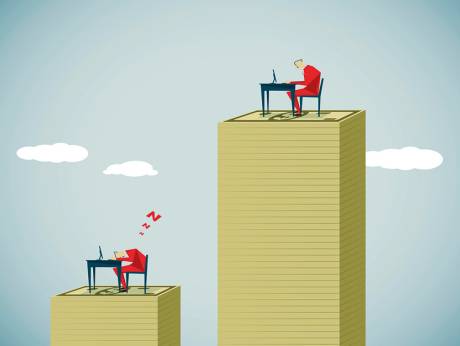Sleep-bragging is the preserve of the ultra–powerful
By Suzanne Moore | Published: 16:40 May 12, 2017 | GulfNews.com

Come sleep with me and my machine. We will do it all night long. Every breath, every movement will be tracked. Every position noted. In the morning, we can compare notes on our performance and vow to do better. Who slept best? Who achieved the right number of cycles? Who woke at precisely the right moment? Who is the most rested? Who really is superior in bed? It’s not me, for sure.
Women of my vintage are in some deja vu tiredness competition with mothers of new babies. We are sleep-deprived and being given as many tips as when we used to do midnight feeds. Have you tried chamomile tea? Sage? Natural fibres? Not drinking? Not being overstimulated by Newsnight? Yes, really.
Sleep-bragging is the province of the ultra–powerful. They get up in the night to go on their treadmills ready for a power breakfast at some awful hour. So ‘90s. Who really cares? Not me. I am an owl and therefore predestined to underachieve. Or have a good time, as I like to think of it.
Virtue-signalling about sleep, about the time you are not productive, tracking it, and maximising its potential is big business. This is why Apple has just bought Beddit, a sleep tracker. A Fitbit for the unconscious, one might say, that can potentially be used with an Apple Watch. I ditched my Fitbit because it became too clingy and demanding, so why would I want this? But I guess Apple knows more than me, as in the United States alone there are up to 70 million adults thought to have sleep or wakefulness disorders. Remember, US President Donald Trump sleeps for four hours a night, as did former British prime minister Margaret Thatcher. British Prime Minister Theresa May looks like she could do with a lie in.
Still, the thing is to be woken at precisely the right time in your sleep cycle by an “intelligent” alarm clock.
Stop. Right now. Press snooze. An intelligent alarm clock would not wake you at all. An intelligent society would not be giving us these contradictory messages that one has to switch off from all forms of technology/blue screens etc to get a good sleep and then use that same technology to track us and also, of course, collect our data. Something is up here — and it’s not just us at four in the morning. Some ideology about what matters is making us unable to rest. Making sleep somehow performative is the opposite of restfulness, and yet this is exactly what we are doing.
Sleep disorders exist. If you are exhausted, with a crying baby, you may have resorted to the dreaded sleep training in which the child is meant to learn to sleep without being comforted. Why do this? When I had my first child and was at college, I put her to bed late so she woke up late. My mother was horrified. “How will she ever get up for work in the mornings?” she said. My daughter was six months old.
The focus on sleep — the lack of it, its enhancement, the recording of it — misses much of the deeper importance of sleep and, indeed, wakefulness. There are times in one’s life when not sleeping is a sign of being fully alive: Love, dancing, talking.
There are times when it’s awful. Depression may manifest itself as not getting out of bed, but also never being able to sleep. But to view sleep as a time to be monitored or as time lost is troubling.
Whether we believe the function of dreams is to merely process information or to tell us something about a hidden part of ourselves, dreaming matters. The older I get, the more certain I am of this. Those people who say they don’t dream, as though it is a badge of honour, are aliens, for even machines are beginning to dream.
Artificial intelligence may mirror both consciousness and unconsciousness. The image-recognition neural networks of Google produce “dreams”, some beautiful, some scary, of hypnotic landscapes, buildings and bridges. The mysteries of sleep — sleep walking, lucid dreaming, prophetic dreams, night terrors — are glimpses into a world we either pretend does not exist or is reducible to the correct amount of sleep by which we can function in our workplaces. Workplaces that may no longer need us because of machines. We should therefore assess our health not by the quantity of our sleep but by the quality of our reveries. We can but dream.
— Guardian News & Media Ltd
Suzanne Moore is an award-winning columnist for the Guardian.




